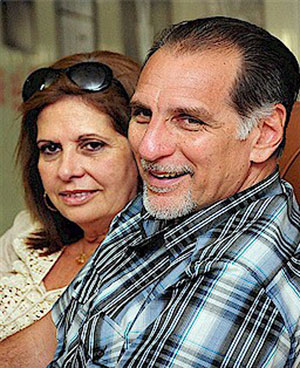

Vol. 77/No. 19 May 20, 2013

|
| Granma/Jorge Luis González |
| “I urge people to publicize our cause in the U.S.,” said René González, above with wife Olga Salanueva at May 6 press conference in Havana. “We will continue the battle until the other four are returned.” |
González traveled to Havana April 22 under a two-week court-ordered release to attend a memorial for his father Cándido González, who died April 1. On May 3 U.S. District Judge Joan Lenard ruled he could serve the remaining half of his supervised release in Cuba on condition he renounce his U.S. citizenship and never return to the United States.
“Fighting to free Fernando [González], Antonio [Guerrero], Gerardo [Hernández] and Ramón [Labañino] will be the priority of my life,” González said May 6 at a press conference in Havana. “There can be no justice. We endured a long trial plagued with irregularities and absurd sentences. But we will continue the battle until they are returned to Cuba.”
González holds dual U.S. and Cuban citizenship, having been born in Chicago before moving to Cuba with his parents when he was five.
His first motion to serve supervised release in Cuba, filed while still in prison, was rejected by Judge Lenard on the basis of his dual citizenship, in spite of the fact that released prisoners with dual citizenship are normally allowed to serve parole in the other country.
The U.S. government urged rejection of his second motion filed last June, despite a long-standing offer by González to renounce his U.S. citizenship. Lenard granted the motion May 3 after the U.S. Justice Department reversed its position and said it would accept the offer.
“The Justice Department explained its turnabout,” an Associated Press dispatch reported May 3, “by saying that since González was already in Cuba, there was no longer concern that he would use a promise of citizenship renunciation to improperly return to the island.”
On May 6 González went to the U.S. Interests Section in Havana to begin the paperwork for renouncing his U.S. citizenship “as bystanders in the streets and on apartment balconies above applauded and called his name,” Reuters reported. Known internationally as the Cuban Five, they are called the Five Heroes in Cuba, deeply respected by millions there for their example of determination and steadfastness in defense of the Cuban Revolution.
The Five were living and working in southern Florida where, at the request of Cuban security services, they monitored and kept Havana informed of activities by armed Cuban-American counterrevolutionary groups with a long record of violent attacks on Cuba and supporters of the Cuban Revolution.
After “stealing” a crop-duster plane in Cuba and ostensibly defecting to the U.S. in December 1990, González was welcomed into counterrevolutionary circles and integrated into paramilitary groups dedicated to the overthrow of the Cuban Revolution, a goal shared by Washington.
González became a pilot in Brothers to the Rescue, an organization established in 1991 by CIA-trained operative José Basulto. In the mid-1990s the group began organizing flights penetrating Cuban airspace designed to provoke a confrontation with Washington.
Despite repeated warnings from Havana that the incursions would not continue with impunity, the U.S. government did not stop them. In January 1996 a Brothers to the Rescue operation dropped counterrevolutionary propaganda on the island. The following month, after repeated warnings to turn back, Cuban fighter jets shot down two of the group’s planes that had once again entered Cuban airspace.
The Five were arrested in FBI raids in September 1998 and framed up on various conspiracy charges. René González received the shortest sentence — 15 years on charges of failure to register as a foreign agent and conspiracy to act as the unregistered agent of a foreign government.
“I did it as a Cuban patriot and I have no regrets,” González is quoted as telling Associated Press in a recent interview. “I’ve never doubted myself for a second.”
González has family in Cuba, including his wife Olga Salanueva, two daughters Irma and Ivette and his mother Irma Sehwerert. Salanueva had been barred entry into the U.S. to visit González while he was in prison, as is Adriana Pérez, the wife of Gerardo Hernández who was sentenced to two life terms plus 15 years.
In mid-April Pérez spoke at meetings in Canada organized by the United Steelworkers, one of the largest unions in the country. An example of growing support for the Five, the 650 delegates attending the Steelworkers national convention unanimously adopted a resolution pledging to campaign for the Five’s release.
The coming “5 Days for the Cuban 5,” which will take place May 30-June 5 in Washington, D.C., are being built as an opportunity to broaden the campaign to free the remaining four revolutionaries. The series of events includes an international rally June 1 in front of the White House.
“The only thing lacking is for people in the U.S. to know the case well,” González said at the Havana press conference. “That’s why I urge those here to help publicize our cause in the United States.”
Related articles:
Why revolutionaries condemn terror methods, from Boston to Colombia
Join, build ’5 days for the Cuban 5’
Cuba’s Rebel Army and peasants became ‘unbeatable force’
Front page (for this issue) |
Home |
Text-version home